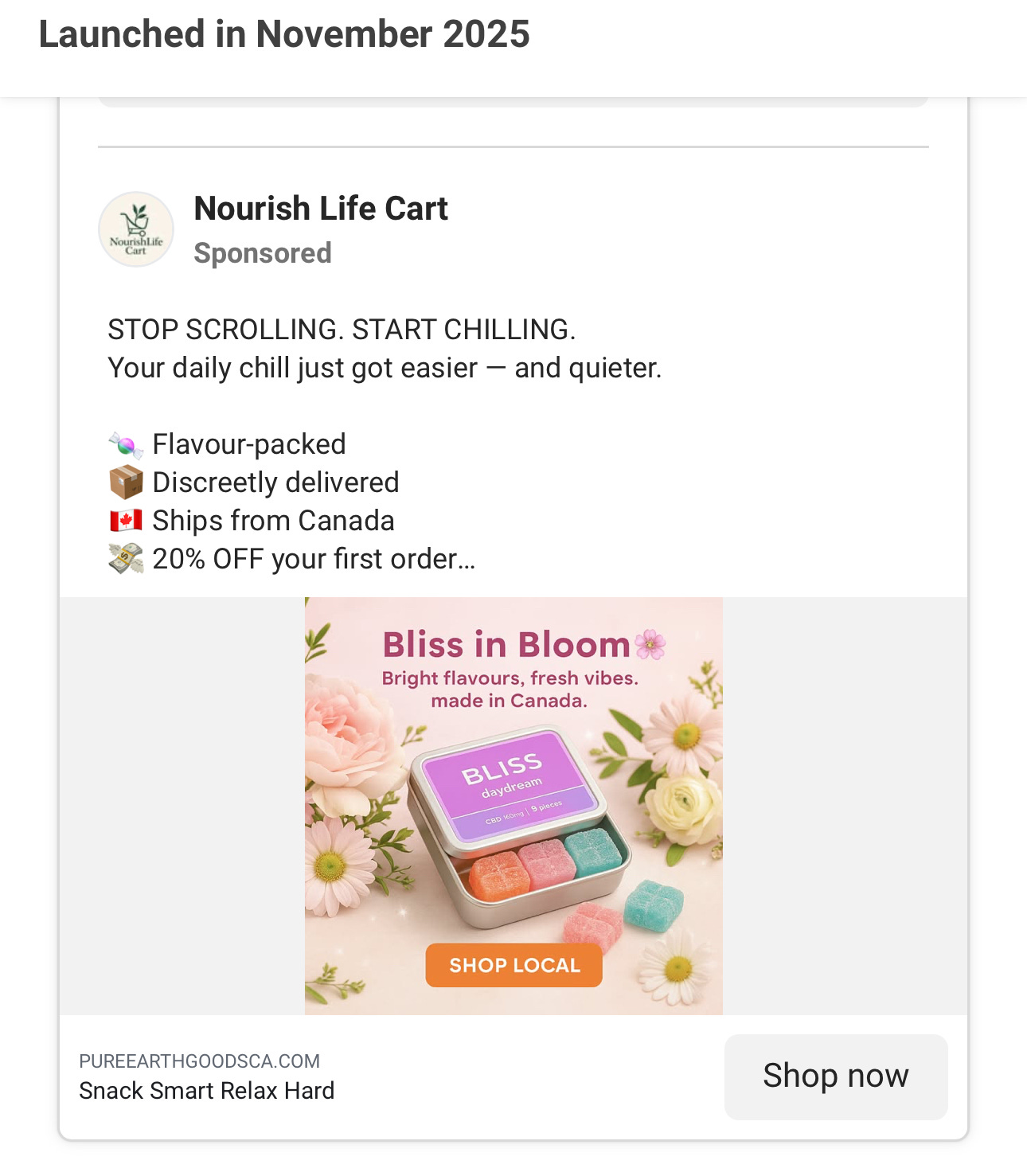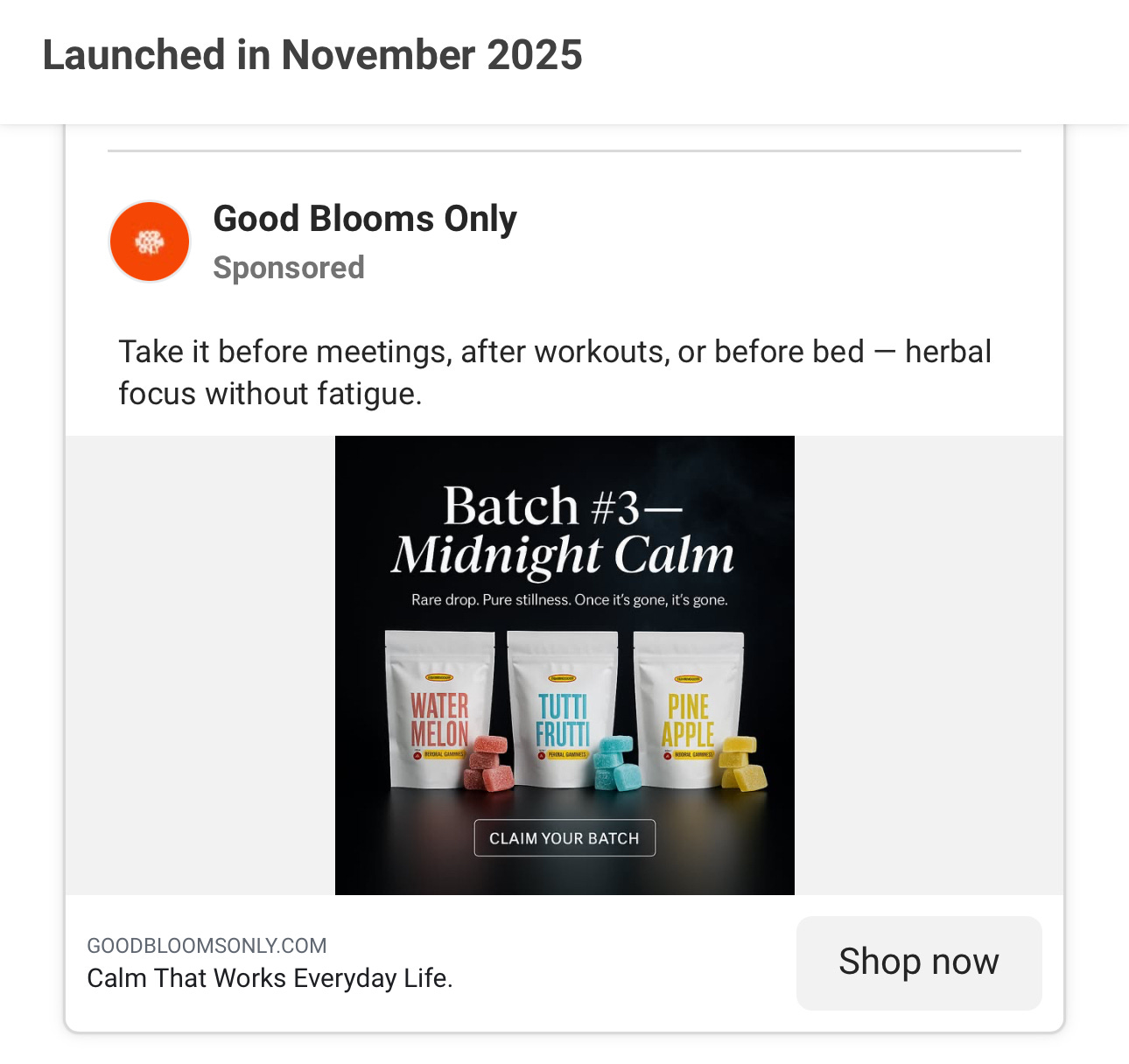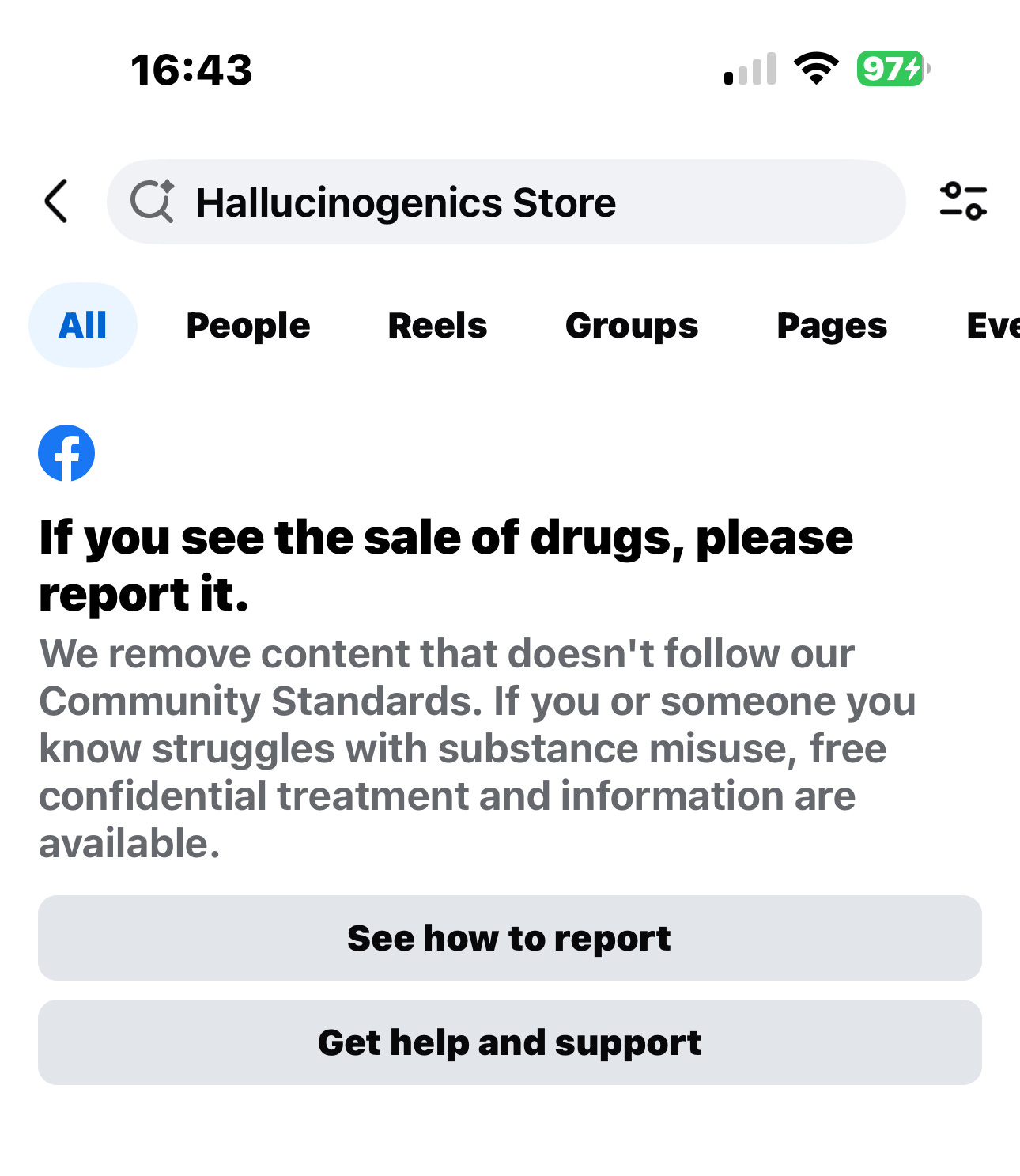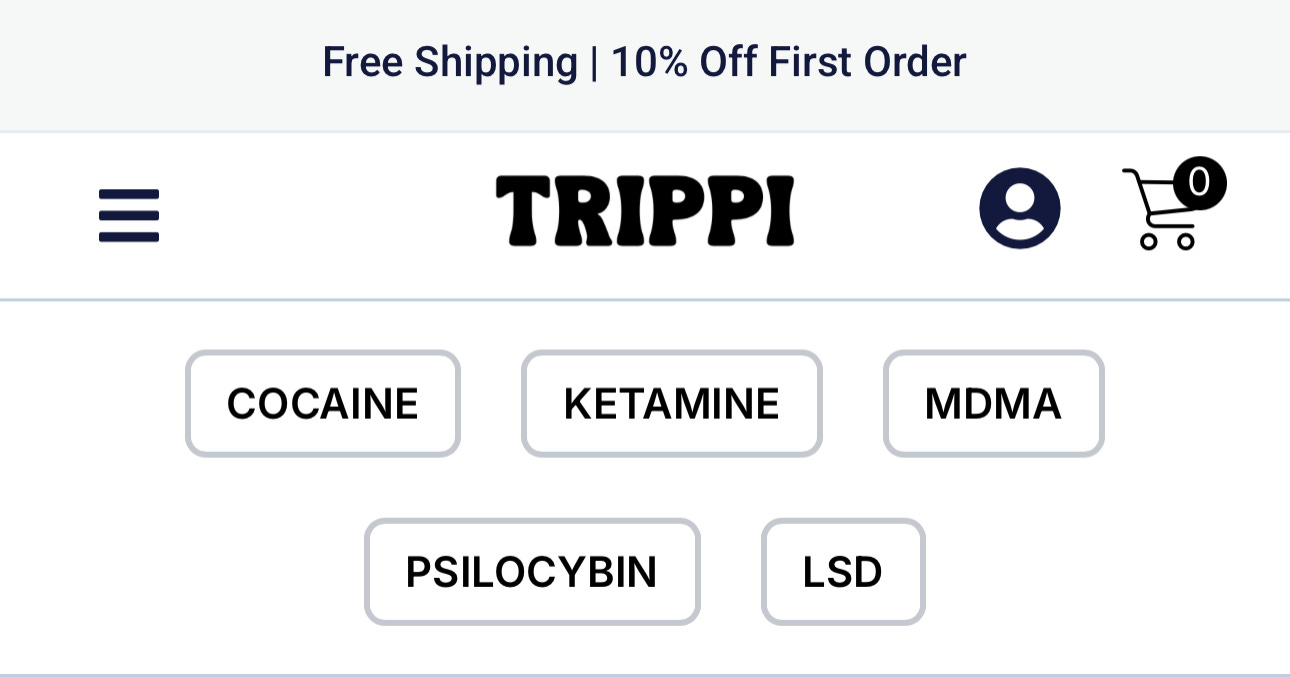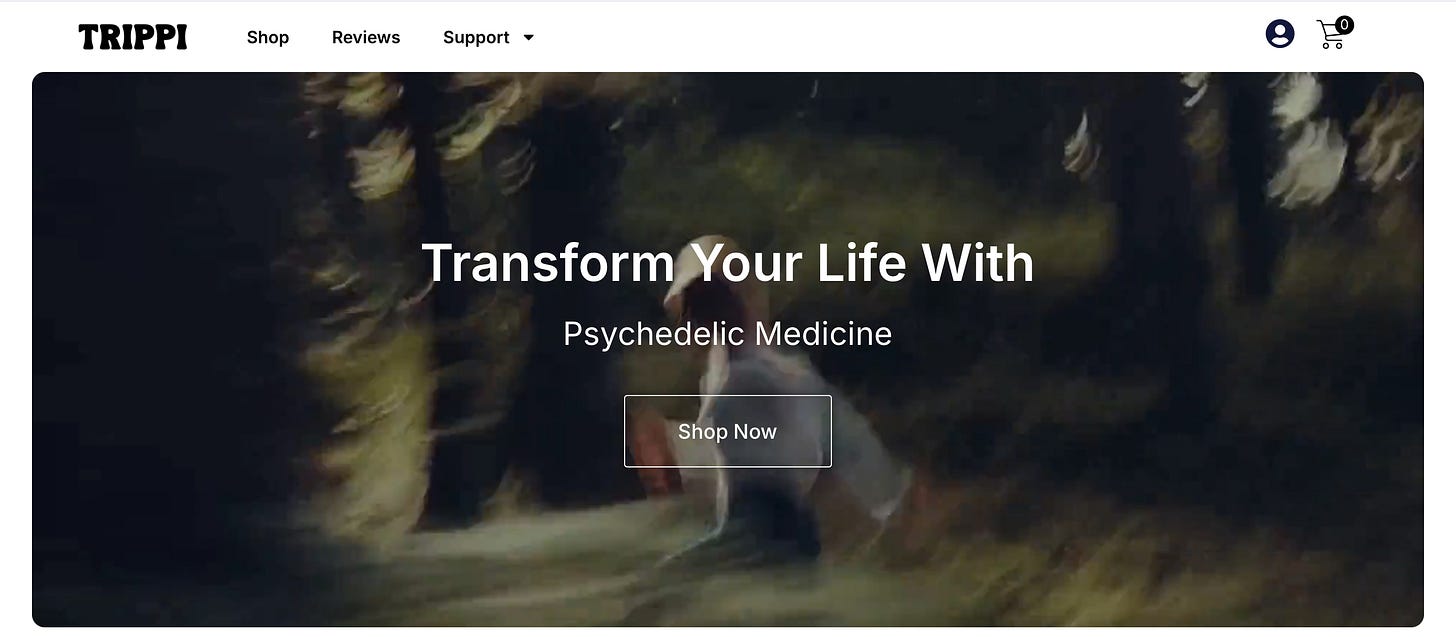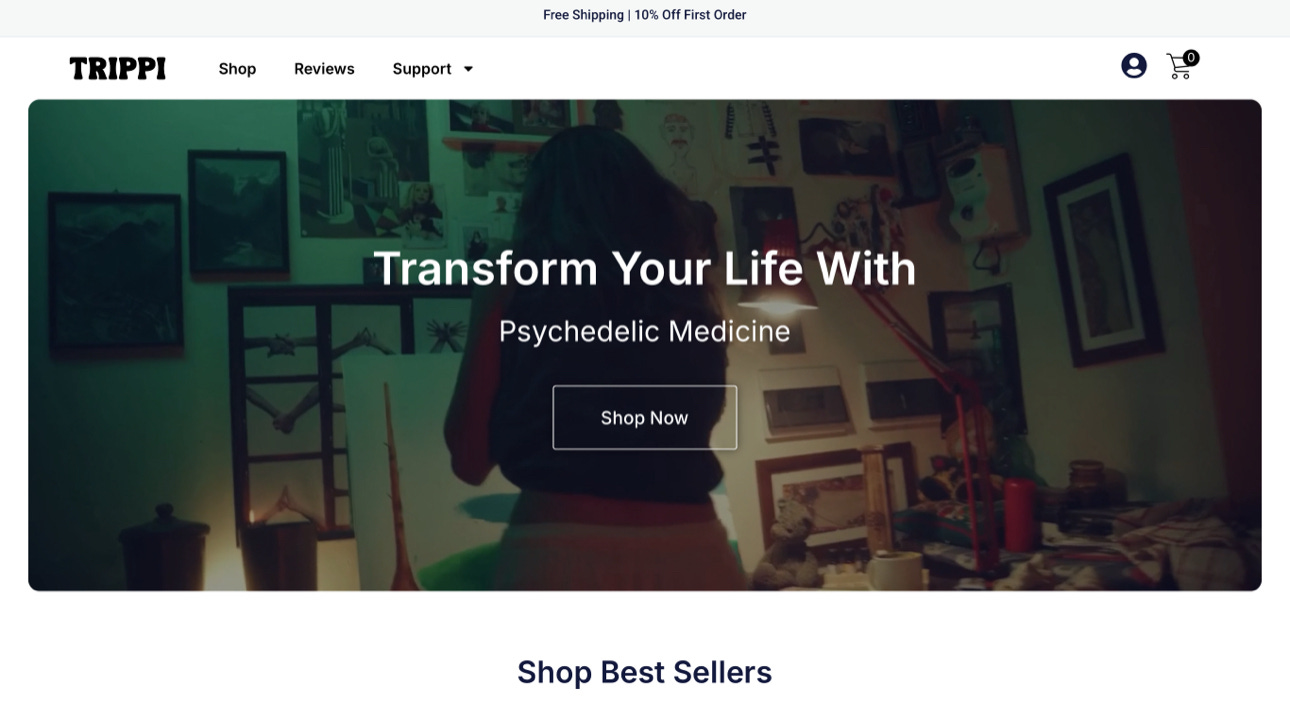Why Does Facebook Run Ads for Schedule 1 Drugs?
people can mail order drugs on Facebook and Meta seems unable or unable to stop it
Before I get into this, I will note that, as of present time of writing, November 8th, Brain Chill Supply no longer has a Facebook page and its website shows coming soon. To Meta’s credit, they’ve taken down many of the profiles I saw running ads for Schedule 1 drugs in July. I wrote down the names of the Facebook profiles running ads for the sale of Schedule 1 drugs in July, I counted 19, today only one remains. However, to Meta’s bad, I did find several new Facebook drug dealers. So, it seem that, as fast as Facebook removes the forbidden ads, more appear.
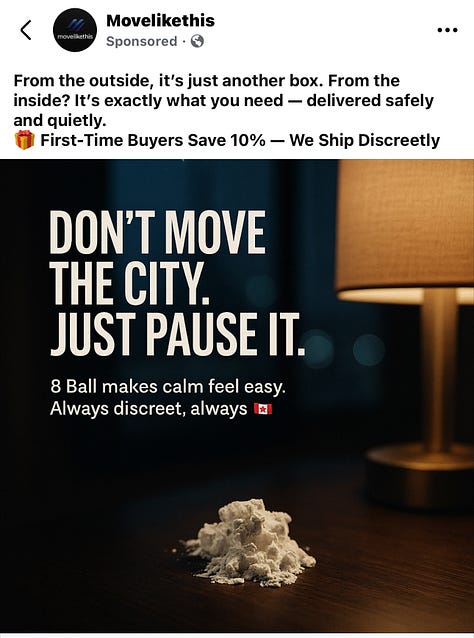
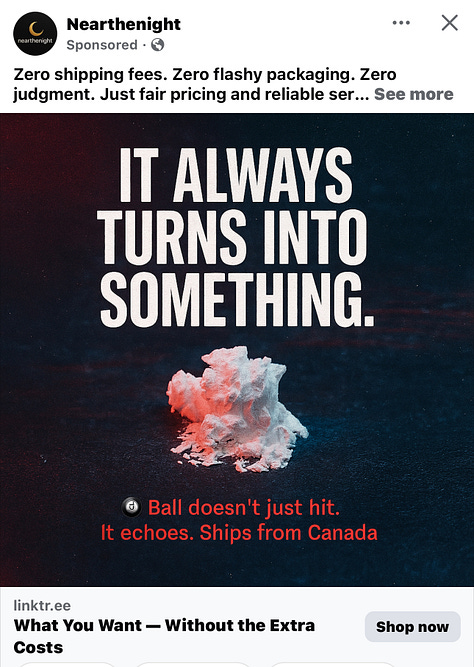
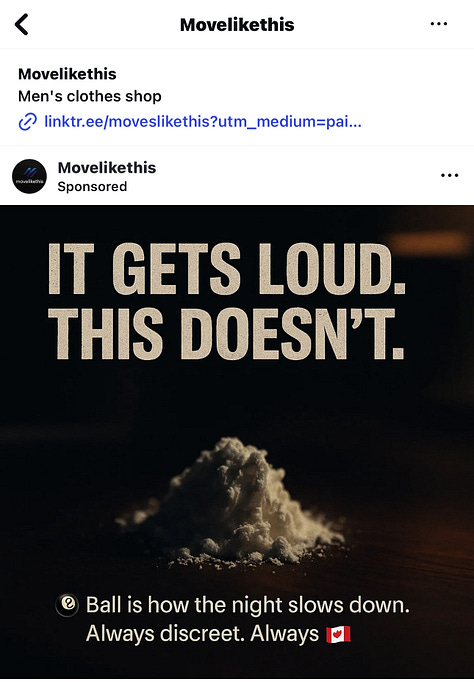
Back in July, a friend saw an ad for Brain Chill Supply on Instagram. It looked an awful lot like ad for illicit drugs. Was it, really? Could it be? I thought to myself, did my friend just see an ad on Meta for psychedelics? Yes. Yes, reader, she did indeed. I followed the breadcrumb and found the Facebook page and then I learned anyone can see the ads a Facebook page runs through Page Transparency, under the About section of the page profile. I barely believed what I found. I spent hours over several days examining several Facebook pages running ads for drugs. In several cases I found that the link in the ad took me to the same few websites, and that one in particular, Trippi[dot]cc, kept popping up.
I’ll get to Trippi later, first, I want to introduce you to Chemagora[dot]ca, a company that’s been running ads for Schedule 1 drugs since the summer. Here’s Chemagora’s ad library on Facebook, and below you can see the ad the company has run for nearly 6 months.
Chemagora brands itself as Canada’s most trusted supplier. Only, the when I geolocate the IP address, I get a residential address in a small town in the midwestern US with population less than 600. In July, the IP address would geolocate to an industrial estate in a Provo, Utah. Nonetheless, the company targets Canadians. Chemagora only ships within Canada, according to the shipping information on the website. The company sells hallucinogenic chemicals. For reference, 4-HO-MiPT Fumarate refers to a chemical compound closely related to psilocin, the active ingredient in Psilocybin (magic mushrooms); fumarate means delivered in salt form.
So, why is Facebook runnings ads for Schedule 1 drugs?
Facebook profile Fresh Flow Supply has a website called Bloom Supply.
The link in Facebook profile Nourish Life Chart’s ad goes to the website Bloom Supply.
The link in Facebook profile Really Good Blooms’s ad goes to Bloom Supply.
The link in the Facebook profile Grizzly Herb’s ad goes to a website called Grizzly Herb. People from Panama (2), United States (2), Canada (1), Netherlands (1), and Ukraine (1) manage the Facebook page.
The link in the Facebook profile Good Blooms Only’s ad goes to the Bloom Supply website.
The Facebook algorithm shows users more of what they click on, so the more drug dealer profiles I check out, the more I will see in my feed. Above I’ve shown a few of the profiles running ads for drugs that I’ve seen today. Canada removed cannabis from Schedule 1 in 2018, however it’s illegal to sell it without government authorisation, and it violates Facebook policy. Also, cannabis remains a Schedule 1 drug in the USA. Back in July Facebook running ads for Schedule 1 drugs came as a surprise to me. Naïve, right? I soon learned that other researchers and investigative journalists have reported on this for a while now. In March 2024, The Wall Street Journal reported that US Federal Prosecutors had begun investigating Meta on the issue. The day before the WSJ story broke, Meta’s president of Global Affairs announced it would join Alliance to Prevent Drug Harms.
The Conversation ran a piece in May of 2024, it touched on the social media drug trade and data harvesting. Tech Transparency did a feature on Meta drug ads in July of 2024. In September of 2024 PBS News ran a story about a 17 year old girl who bought Fentanyl-laced Percocet from an Instagram dealer and died shortly after. Wired ran a feature on social media drug dealers last December. In April of this year USA Today ran a story about an 18 year old who bought Fentanyl-laced cocaine from a Facebook dealer in 2020 and died from an overdose. I wrote to Meta in July, inquiring about the Schedule 1 drugs ads I saw and they never responded.
Also in July of this year, New Zealand Herald reported that they found 56 ads for drugs on Facebook in a day. A man who received a warning from Facebook that selling a dartboard constituted sale of a dangerous weapon received no response from the over 200 separate complaints he made against the sale of Schedule 1 drugs on Facebook. Meta can’t stop running ads for Schedule 1 drugs however it can flag and suppress the NZ Drug Foundation’s posts about the harm of drugs and content about harm reduction. In Canada, CTV reported on Facebook drug ads in January. In February CBC ran a story about children accessing drugs via Snapchat. I found a 2016 CBC story about drug dealers using Facebook messenger to sell drugs in Winnipeg.
What safeguards does Meta have in place to safeguard against illegal activity on its platforms? Meta’s Community Guidelines states clearly content that “coordinates harm and promotes crime” violates its terms of service. It restricts drugs and pharmaceutical goods on its platforms. “we do not tolerate the exchange or sale of any drugs that may result in substance abuse.” Today when I searched for the Hallucinogenic Stores profile on Facebook, I got a notification telling me to report the sale of drugs. That shows an improvement in Meta’s commitment to appropriate safeguarding. It doesn’t suffice, the tech industry and social media companies need to buckle up and tackle this problem head on. A few days ago Penn State University Social Science Research Institute published a brief on social media and Fentanyl sales.
So, let’s talk about the Trippi website now. To clarify for readers, whilst it did back in July, Trippi now has no presence on Meta, in any form, under Trippi, or any other name that I could find. However Trippi still exists as a standalone website selling Schedule 1 drugs to Canadians. Today the Trippi[dot]cc website exists exactly as I first saw it in July, except that it redirects to Trippi[dot]nu.
Nu refers to Niue, for those who wonder. Interestingly, nu means now in Swedish. The government of Niue held the rights to the nu domain extension until signing it away in 2003 to Massachusetts-based IUSN Foundation, in exchange for free wifi access for the small Polynesian island. In 2013, the Internet Foundation in Sweden acquired the rights to the nu domain and the government of Niue has tried unsuccessfully to reach an agreement to regain rights to it. The tiny island has been pursuing the rights to its domain extension for nearly 20 years, and the Prime Minister referred to the situation as a kind of digital colonisation.
Back in July when I tracked IP addresses of the various websites associated with the many Facebook drug ads, I came across a company called Withheld For Privacy, which has a sketchy reputation. Created by Namecheap, Withheld For Privacy allows those operating online domains to shield their identity. Interestingly, Namecheap promotes nu domain extensions as an alternative to a com domain extension. When do privacy measures become a tool for criminals to dodge transparency?
So, why does Tripp[dot]cc now take me to Tripp[dot]nu? I don’t know. As an aside, the cc domain extension, originally for Cocos Island, has more than its share of shady content. Does the nu domain extension have more than its share of sketchy sh1t? I couldn’t find any evidence to that effect.
So, what’s the Trippi website all about, and what can you buy?
Trippi[dot]cc sells Cocaine, Ketamine, Psylocibin, MDMA and LSD. These drugs appear on schedule 1 of the Controlled Drugs and Substances Act (CDSA). The Cocaine comes in powder and nasal spray form. Shoppers can purchase up to 3.5 grams of powder and 2 grams of nasal spray. Cocaine nasal spray comes in a flavoured options that include grape, strawberry and coconut. Ketamine comes in powder and nasal spray form; nasal spray flavours include strawberry and grape. Shoppers can get Psylocibin in gummy candy form — choices include blue raspberry, fruit punch, grapefruit. Or shoppers can opt for a macrodose capsule or they can choose the old fashioned version, the mushrooms themselves. MDMA comes in moon rock form and nasal spray. Shoppers can choose grape or root beer moon rocks and regular or strawberry nasal spray.
Prices range from $85 to $130 per gram, depending on product. Shoppers can use Credit and Debit cards, Interac e-transfer, or Crypto to buy their illegal drugs from this vendor. “Discreet names on credit card statements are used for privacy,” reads a disclaimer. Trippi sells only within Canada and ship their orders through Canada Post.
Trippi has a Harm Reduction resource section, with links to the Centre for Addiction and Mental Health as well as the Canadian Centre on Substance Use and Addiction. Trippi gives tips for “safer approach to responsible use” of psychedelics. The company provides Harm Reduction guidance on the importance of education and awareness, testing substances, starting low and going slow, creating a safe environment including designating a “trip sitter”, avoiding mixture of substances. Trippi warns that “many research chemicals are misrepresented or adulterated, leading to unintended and dangerous outcomes. Using drug-testing kits can help prevent these risks.”
Trippi doesn’t sell drug testing kits, claims its products are fully tested for purity and no contaminants. The website refers users to DanceSafe for more information about dosage and other specifics regarding psychedelic drug consumption. The illicit drug website claims if they follow certain principles “users can embrace the therapeutic potential of psychedelics while maintaining safety and responsibility.” Users have access to a self exclusion mechanism, whereby a user can choose to permanently exclude themselves from purchasing drugs from the website. An individual initiates a self exclusion request by filling out an online form with their name email and mailing address. Self exclusion is permanent.
So, reader, I have some thoughts about this website, generally I have thoughts about online purchasing of Schedule 1 drugs.
First of all, it’s all designed to make these harmful drugs harmless and appealing. You can “transform your life with psychedelic medicine,” Trippi tells me, as it shows healthy middle class women having a great time twirling around a meadows and running through the woods, and painting a picture in a middle class looking home. All very misleading marketing promises. Trippi has a very Nine Perfect Strangers vibe.
The Trippi website raises several questions.
I’ve reviewed Meta safeguards above, so won’t repeat them again here. Several other questions remain, though. What implications exist for banks and credit card companies themselves, with respect to payment for illegal substances? What policies does Interac have, regarding use of its service to make illegal purchases? What policies does Canada Post have, regarding participating in transportation of Schedule 1 substances? What about web hosting companies? What measures do they have in place to prevent their company enabling the promotion and sale of Schedule 1 drugs? How effective do their Acceptable Use Policies prove? For example, in its ToS, Cloudflare states “as a condition of your use of the Websites and Online Services, you will not use the Websites or Online Services for any purpose that is unlawful or prohibited by these Terms.” How does a company like Cloudflare ensure that customers don’t use their services to break the law?
Visa’s corporate website states that Visa prevents, identifies, and removes illegal activity on its network. Mastercard’s Rules states that “a Merchant must not submit to its Acquirer, and a Customer must not submit to the Interchange System, any Transaction that is illegal, or in the sole discretion of the Corporation, may damage the goodwill of the Corporation or reflect negatively on the Marks.” Every credit card company would have a similar policy about illegal purchases.
Interac Terms and Conditions stipulates the following to those using the service: “You agree that you will not use, permit the use of, or advocate, promote, assist or facilitate the use of the Interac e-Transfer service or the Sites in a manner that is, in whole or in part: (A) criminal in nature, gives rise to civil liability or otherwise violates applicable law; or (B) harassing, hateful, illegal, profane, obscene, defamatory, threatening, injurious, discriminatory or that promotes or encourages inappropriate activity.”
Canada Post warns against illegal mail, such as “it’s an offence if you use the mail for the delivery of articles that are obscene, indecent, immoral, or scurrilous …” and also indicates “prohibited items include packages whose contents are: Explosive, Highly flammable, Radioactive, Otherwise dangerous.” Specifically with respect to drugs and other controlled substances, Canada Post states the following. “The Controlled Drugs and Substances Act and the Food and Drugs Act govern drugs, including narcotics and other controlled substances. You can only mail them in certain circumstances and subject to various restrictions … You must make sure the contents, packaging, and labelling of your shipments follow all applicable federal, provincial, and municipal legislation and regulations.”
The Controlled Drug and Substances Act states clearly that anyone who possesses or tries to obtain a Schedule 1 drug has violated the law and faces penalties of up to seven years in prison. So, the question remains, why is Meta allowing itself to serve as a platform for the promotion and sale of Schedule 1 drugs? Many of us have experienced a temporary ban from Facebook for a writing an offensive post. Some people have experienced lengthy lock outs from their Facebook accounts because of thought crimes they committed. So, why do drug dealers get to promote their illegal drug dealing business on Facebook?




